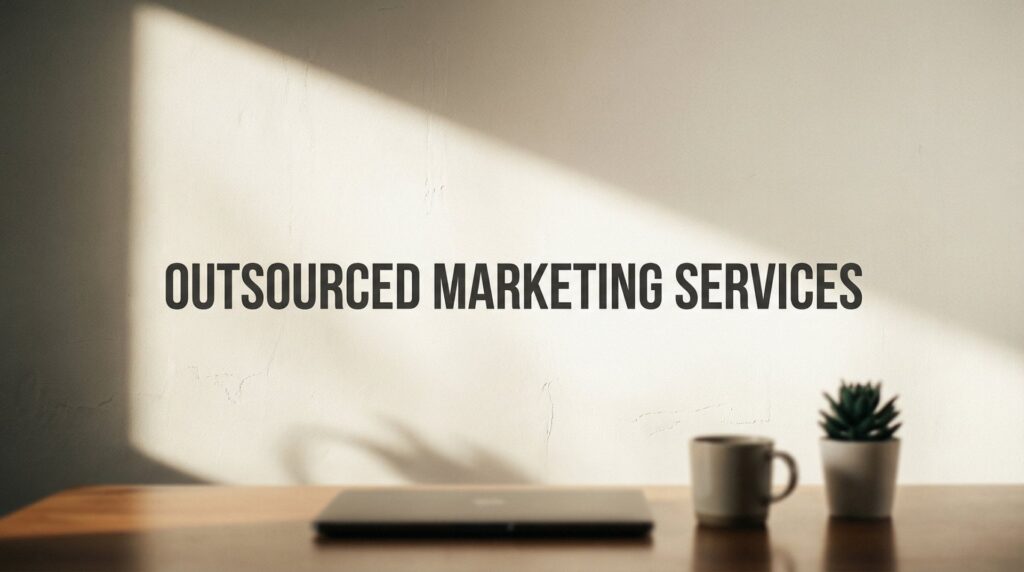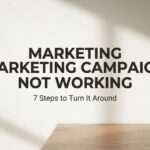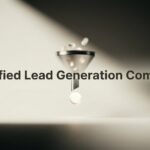When a pipe bursts at two in the morning, homeowners don't check social media. They grab their phone and Google for the fastest help. This is where restoration company SEO becomes your most powerful tool for getting emergency calls.
It’s about being the first name people see when they’re in a real crisis.
Why SEO Gets You Emergency Calls
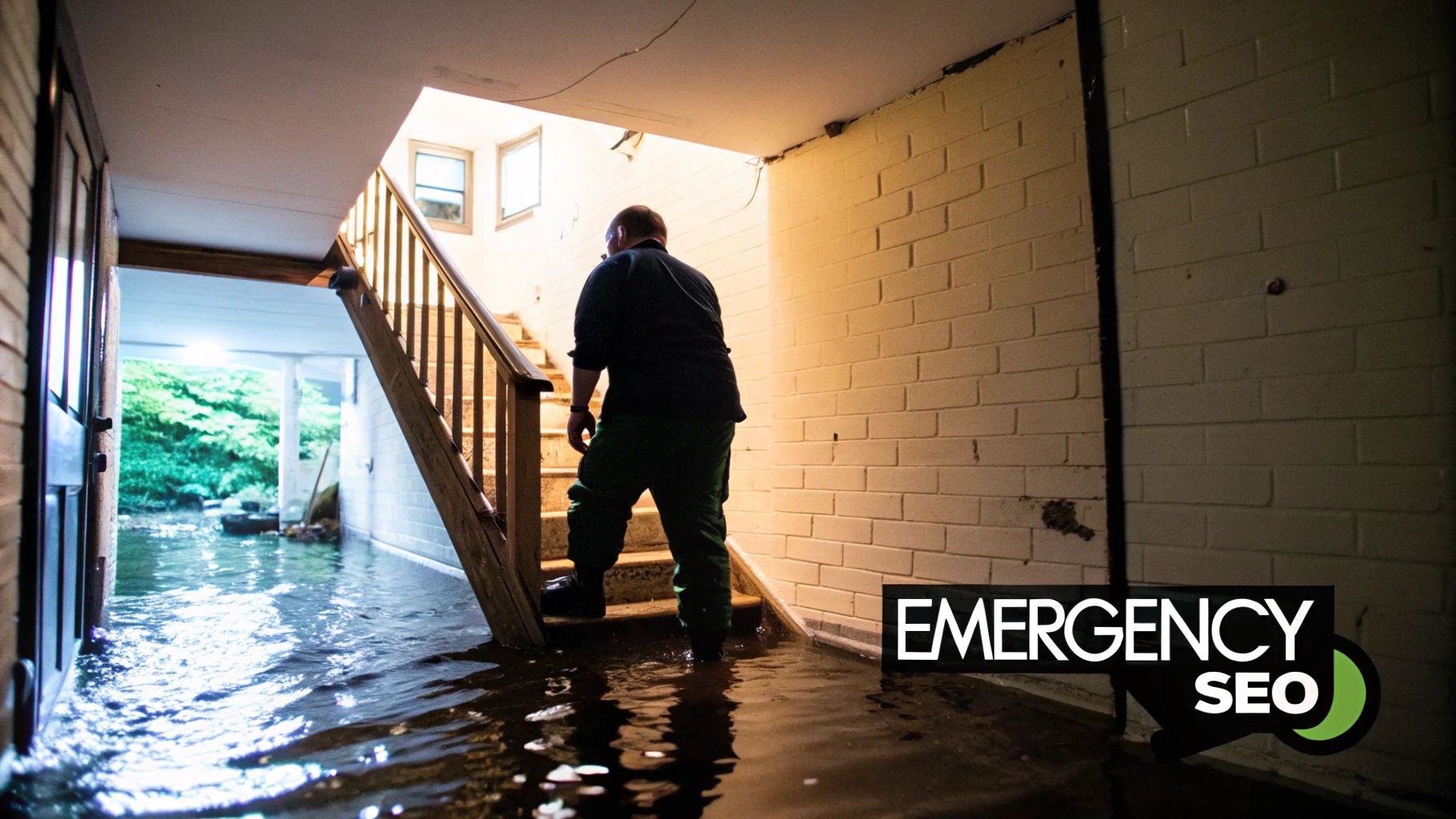
Think like your customer. They're stressed, panicked, and need a professional on-site now. Their first move is usually a search like "emergency water damage repair near me."
This is the moment where SEO proves its value. Unlike paid ads, which many people ignore, a top organic search result feels earned, not bought. It has instant authority.
In Short: Good SEO makes your company the first and most trusted option a homeowner sees during an emergency.
The Power of Being the First Answer
Landing on the first page of Google positions you as the local expert. That visibility creates credibility that advertising can't buy. In a chaotic situation, homeowners want a trustworthy guide, and Google's top results act as a strong recommendation.
Organic search results are about 8.5 times more likely to get clicked than paid ads. When nearly 60% of all clicks go to the top result, a solid SEO strategy becomes essential.
This isn't just about clicks. It's about getting calls from high-intent customers who need your exact services right now. Understanding strategies to increase Google crawl rate and get indexed faster can give you a serious edge.
Building a Long-Term Business Asset
SEO isn't a one-time campaign. Every blog post you write and every link you earn builds on the last. This creates a sustainable source of leads that works for you 24/7.
A PPC ad vanishes when you stop paying for it. Your organic rankings can last for years, consistently bringing in urgent calls.
Your digital presence is a real business asset. It generates leads without a per-click cost and strengthens your brand. It ensures you get the most urgent—and profitable—jobs in your area. For a closer look, check out our guide on SEO for restoration companies.
Winning the 'Near Me' Search with Local SEO
For a restoration company, most SEO is local SEO. When a disaster happens, nobody searches for "water damage repair in the United States." They type "water damage repair near me" into their phone.
Your mission is to be the first name that pops up. This means owning the local search results, especially the Google Map Pack.
Think of your Google Business Profile (GBP) as your digital storefront. It needs to be professional and active. Winning the 'near me' search is non-negotiable for a steady stream of emergency calls.
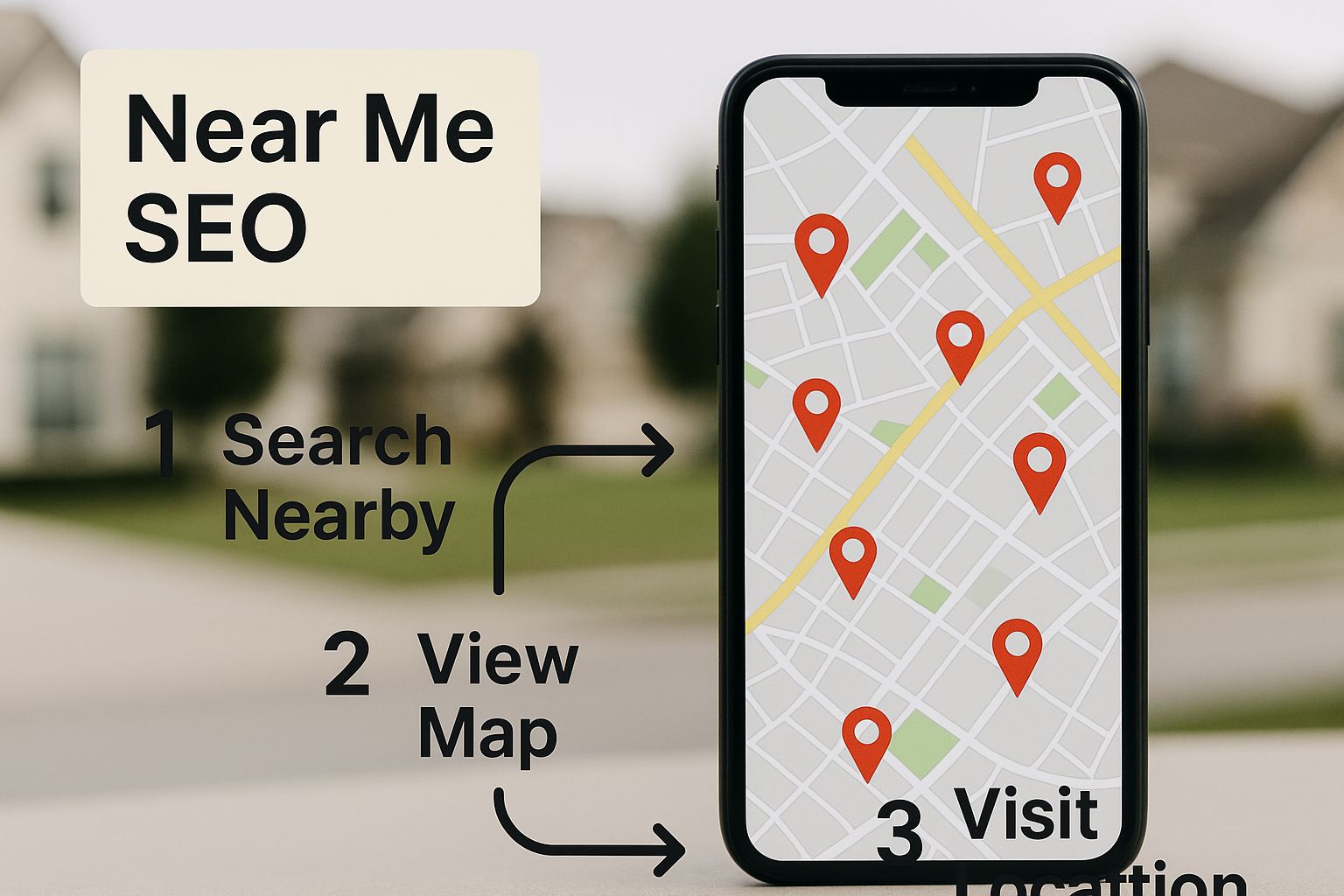
When a homeowner is in crisis, their phone is the first tool they grab. Being visible at that exact moment is everything.
Your Google Business Profile is a Lead Machine
Your Google Business Profile is your most powerful local marketing tool. It’s the engine behind your local visibility for restoration company seo. Claiming it is just the start. The magic happens when you treat it like an active part of your business.
A well-managed GBP gets you found in local searches and lands you in the Google Maps results. By feeding your profile with fresh content, photos, and reviews, you tell Google you're the most relevant and trustworthy option in the area.
Here’s how to turn your GBP into a lead generator:
- Fill Out Everything: Don't skip any sections. List all your services, define your service areas, and set your hours (list 24/7 emergency service!).
- Upload High-Quality Photos Often: Post photos of your clean vehicles, your team in uniform, and compelling before-and-after shots of your work.
- Use Google Posts Weekly: Share quick updates about a job, offer a helpful tip, or announce a new certification. It keeps your profile fresh.
The Importance of Consistent NAP Information
A pillar of local SEO is NAP consistency. This stands for your business Name, Address, and Phone number.
Search engines like Google cross-reference this information across the web to verify that your business is legitimate.
If one directory lists you as "123 Main St." and another has "123 Main Street," it's a red flag for Google. These small inconsistencies can harm your rankings.
In Short: Your NAP is your business's digital fingerprint. If it doesn't match everywhere, search engines won't trust you.
The best way to fix this is to do an audit. Check your listing on major directories like Yelp, Angi, and the BBB. Make sure your NAP is identical everywhere.
Google Business Profile Optimization Checklist
Getting your GBP right is the core of local SEO. This checklist will help you dial in every critical element.
| GBP Element | Optimization Action | Why It Matters |
|---|---|---|
| Business Name | Use your exact, legal business name. No extra keywords. | Keyword-stuffing your name is against Google's rules and can get your listing suspended. |
| Categories | Select a primary category (e.g., "Water damage restoration service") and relevant secondary categories. | This is how Google understands what you do and matches you to relevant searches. |
| Address & Service Area | Set your physical address (if you have one) and define the specific cities/counties you serve. | This tells Google exactly where you operate, which is crucial for showing up in local searches. |
| Phone Number | Use a consistent, local phone number. | This is your primary call-to-action. Inconsistencies hurt your NAP score. |
| Hours of Operation | Clearly state your hours, especially if you offer 24/7 emergency services. | This manages customer expectations and is vital for after-hours emergency calls. |
| Photos & Videos | Regularly upload high-quality images of your team, trucks, and before/after work. | Builds trust, shows professionalism, and signals to Google that you are an active business. |
| Services | List every single service you offer with a brief description. | Helps you rank for specific service-related searches (e.g., "sewage cleanup"). |
| Reviews | Actively request reviews from happy clients and respond to all of them (good and bad). | Social proof is a massive ranking factor and heavily influences customer decisions. |
| Google Posts | Publish a new post at least once a week with updates, offers, or helpful tips. | Keeps your profile fresh, engages potential customers, and provides another signal of activity to Google. |
| Q&A Section | Proactively add and answer common questions people might have about your services. | Positions you as an expert and helps you control the narrative around your business. |
Encouraging and Managing Customer Reviews
Reviews are the lifeblood of your local reputation. A steady flow of recent, positive reviews is one of the most powerful signals you can send to Google and customers. That high star rating in the Map Pack is often the deciding factor for a homeowner in a crisis.
Here's how to get more reviews:
- Just Ask. When a job is done and the customer is happy, ask them to share their experience online.
- Make It Easy. Send a direct link to your Google review page via email or text. Fewer clicks means more reviews.
- Respond to Every Review. Thank customers for positive feedback. For negative reviews, respond professionally and offer to make things right.
For more advanced strategies, check out this guide on how to rank in the Google Maps pack. By focusing on your GBP, NAP, and reviews, you'll win those critical 'near me' searches.
Finding Keywords Frantic Customers Use
https://www.youtube.com/embed/OMJQPqG2Uas
Keyword research for a restoration company is different. You need to get inside the head of a stressed-out property owner. Your SEO strategy depends on how well you do this.
People aren't browsing; they're searching with a purpose. Your job is to find the exact words they're typing in that moment of crisis.
Two Types of Restoration Keywords
Keywords fall into one of two buckets. Understanding this is key to attracting the right traffic.
- High-Intent "Money" Keywords: These are phrases someone types when they need a pro right now. They signal urgency and an intent to pay.
- Informational Keywords: These are used by people looking for answers or DIY tips. They are perfect for blog content that establishes you as an expert.
In Short: Target both urgent "money keywords" for immediate jobs and informational keywords to build long-term authority.
How to Find High-Intent Keywords
Let's focus on the terms that make your phone ring. Think about specific problems and add words that signal location and urgency.
A great place to start is Google. Type a service like "water damage repair" and look at the "People Also Ask" section.
- How do you fix water damage professionally? They're looking for an expert.
- How much does it cost to fix water damage? This person is comparing quotes.
- Who do you call when your house is flooded? A direct plea for a service like yours.
Now, brainstorm keyword combinations. Mix and match services with modifiers.
- Services: Water damage, fire restoration, mold remediation, sewage cleanup, storm damage.
- Urgency Modifiers: Emergency, 24/7, same-day, urgent, fast.
- Location Modifiers: [Your City], [Your County], [Nearby Neighborhood], "near me".
This exercise creates gems like "emergency mold remediation in [Your City]" or "24/7 fire restoration near me." These phrases lead directly to phone calls.
Using Tools to Gain an Edge
Brainstorming is a good start, but tools give you hard data on what people are actually searching.
Start with free tools. For a solid walkthrough, see this guide on how to use Google's Keyword Planner. It shows you search volume for different terms.
Paid platforms like Ahrefs or SEMrush are game-changers. They let you see the exact keywords sending business to your competitors. This intel is pure gold.
You can target the same terms or find less competitive alternatives they’ve missed. For instance, a tool might show that "burst pipe water removal" has less competition than "water damage cleanup" but still gets high-intent searches. That's how you win.
Creating Website Content That Builds Trust Fast
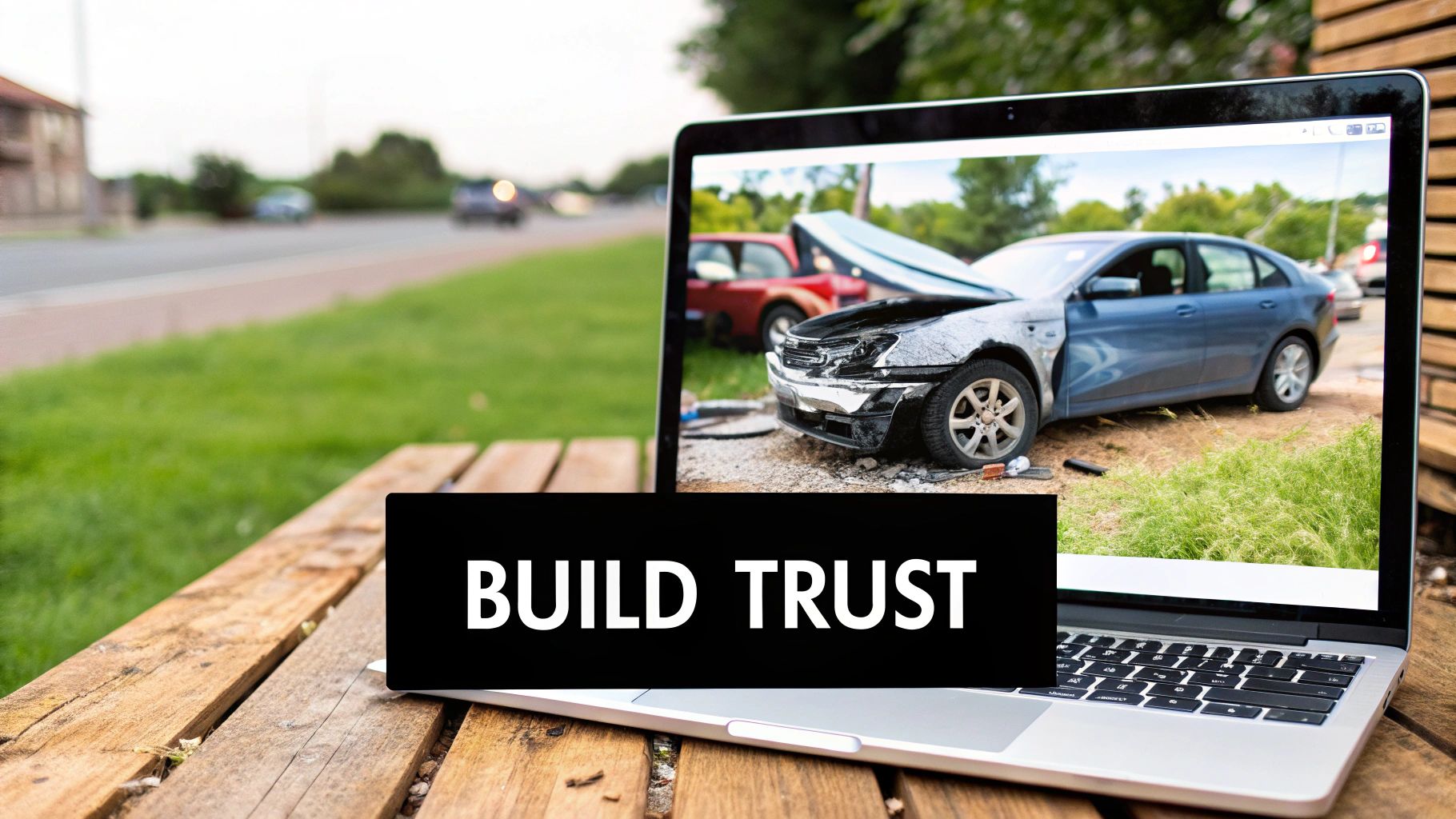
Your website needs to do two things. First, it must calm a panicked homeowner. Second, it must convince Google you're an authoritative expert.
Great content does both. This is the heart of a good restoration company seo strategy because it speaks to both people and search engines.
When someone in crisis lands on your site, they need reassurance and proof you know what you're doing.
Building Service Pages That Convert
Your service pages for water, fire, mold, and storm damage are the most valuable parts of your website. This is where a potential customer decides whether to call you or a competitor.
These pages need to be more than a simple list. They should be a complete resource.
Explain your process in simple terms. What are the first steps they should take? What does your restoration process look like? Answering these questions shows you're professional and organized.
In Short: A great service page sells peace of mind by telling a panicked homeowner, "We've got this."
To make these pages effective, structure them for both people and search engines.
- Use Clear Headings: Use H2 and H3 subheadings like "Our Water Damage Restoration Process" or "Signs of Hidden Mold." Stressed homeowners scan for answers.
- Show, Don’t Just Tell: Before-and-after photos are proof of your skills. Nothing is more convincing than a visual transformation.
- Include Real Testimonials: Sprinkle quotes from happy customers directly on the relevant service page for maximum impact.
Answering Questions Before They Become Emergencies
Your service pages catch emergency calls. Your blog builds trust long before a disaster. This is your chance to answer the "informational" questions people search for.
A homeowner might search "what does mold smell like?" or "how to dry carpet after a small leak." If your helpful blog post shows up, you've put your company's name in their head as a trusted expert. This strategy builds brand recognition. When that small leak becomes a flooded basement, you’re the first one they remember.
Content Ideas Your Restoration Website Needs
A smart content plan targets different types of customers. You need content that helps people right now and people just doing research.
| Content Type | Purpose | Example Topics |
|---|---|---|
| Core Service Pages | To capture high-intent, emergency leads and explain your process. | "24/7 Fire Damage Restoration," "Emergency Water Extraction Services," "Professional Mold Remediation" |
| Local Landing Pages | To rank for "near me" and city-specific searches. | "Water Damage Repair in [Your City]," "Storm Cleanup Services in [Your Neighborhood]" |
| Blog Posts | To answer informational questions and build long-term authority. | "5 Signs of a Hidden Water Leak," "What to Do Immediately After a Kitchen Fire," "Is Black Mold Dangerous?" |
| Case Studies | To provide in-depth proof of your work and expertise on complex jobs. | "Case Study: Restoring a Flooded Commercial Basement," "From Soot to Safe: A Fire Restoration Story" |
What Is the Purpose of E-A-T in SEO?
E-A-T stands for Expertise, Authoritativeness, and Trustworthiness. It's a concept Google uses to judge if a website is legit. For a restoration company dealing with property, health, and safety, proving E-A-T is non-negotiable.
How Do You Demonstrate E-A-T?
Show it, don't just say it. Demonstrate E-A-T with high-quality, accurate content. Show off team certifications (like from the IICRC), write detailed case studies, and use real customer testimonials. Every piece of content should communicate expertise.
How Do I Write SEO Content for My Website?
First, pick one primary keyword for each page (e.g., "fire damage repair [your city]"). Include it in the page title, the main H1 heading, and a few times in the text. Most importantly, write for your customer. Answer their questions clearly and provide real value. Google rewards that.
Creating top-tier content that proves your expertise is a major focus in SEO. For more insights, check out this guide on mastering digital marketing for restoration companies.
Building Authority Beyond Your Website
A great website is only half the battle. Google needs to see that other respected websites vouch for you. This is called "off-page SEO." It’s about building your company's credibility across the web.
Think of it like a real-world referral. Backlinks—links to your site from other websites—are the digital version of that.
It's not about the number of links. It’s about earning high-quality, relevant links that signal you're an expert.
Partnering with Local Allies
For a restoration company, the most valuable backlinks come from other local businesses that see disasters first. These partnerships are a huge part of an effective restoration company seo strategy.
- Plumbers and HVAC Techs: They find burst pipes and failing units. A link from their website is gold.
- Roofing Contractors: When a storm hits, they find water damage in attics and need someone to refer.
- Local Insurance Agents: An agent is often the first call a homeowner makes. A relationship here can lead to backlinks and high-quality jobs.
In Short: Don't just ask for a link. Build a real relationship. Offer to write a guest post for a local plumber's blog.
Many local service industries use similar authority-building principles. You can get good ideas by looking at insurance agency SEO strategies.
Earning Trust Through Community Involvement
Showing you're an active part of your community sends powerful trust signals to Google.
Sponsor a local Little League team to get a link from their website. Get featured in the local news for a charity drive.
These types of links are:
- Hyper-local, which reinforces your service area.
- From trusted domains, like news outlets or community groups.
- Completely natural, which search engines reward.
Why Your Reputation on Other Sites Matters
Your company’s reputation on major review sites is a huge trust signal for Google and customers.
Google already trusts sites like Yelp, Angi, and the Better Business Bureau (BBB). When your business has a complete, positive profile on these platforms, it confirms you're the real deal.
Actively manage these profiles. Respond to reviews, keep info updated, and maintain a high rating. It shows you’re a real business that cares about its customers.
Common Questions About Restoration SEO
Let's get straight to it. You have real questions about what works, how long it takes, and if SEO will actually make your phone ring.
Here are the answers to questions we hear all the time.
How long does SEO take to show real results?
The honest answer: it takes time. SEO isn't like flipping a switch. You're building a long-term asset.
You might see positive movement in your local map rankings in 3-4 months. But the real, lead-generating results take longer.
Plan for a 6- to 12-month timeframe to see a significant flow of organic traffic and calls. It takes that long for Google to trust your website as an authority in your area. Think of it like building a reputation in your community—it pays off for years.
What is more important: local SEO or general SEO?
For a restoration company, local SEO is the absolute priority.
Your customers are nearby, dealing with a disaster, and searching on their phones for the closest help.
- Local SEO gets you in the Google Map Pack for searches like "emergency water damage near me." This is where the most urgent jobs come from.
- General SEO is broader. It might attract people from anywhere, which is great for a blog but won't lead to an emergency dispatch.
Your strategy should be about 90% focused on dominating local search. Nail down your city and surrounding towns first.
Can I do restoration SEO myself?
Yes, many business owners start on their own. It’s the best way to understand the process.
Here’s what you can realistically do yourself:
- Optimize your Google Business Profile: Fill out every section and upload new photos and posts weekly.
- Systematize review requests: Ask every happy client for a review and send them a direct link.
- Cover on-page basics: Make sure your service pages have clear titles and headings with your service and city name.
However, the more technical stuff—like advanced keyword research, building quality backlinks, and site speed optimization—is a full-time job. Many owners handle the basics and then hire an expert to scale their results.
What SEO metrics should I actually track?
It’s easy to get lost in data. Don't fall for "vanity metrics." Focus on numbers that translate directly to revenue.
- Phone Calls from Your Google Business Profile: This measures emergency leads from your local SEO efforts.
- Organic Traffic to Core Service Pages: Are more people finding your water, fire, and mold pages?
- Website Form Submissions: How many people are filling out your contact forms?
- Google Map Pack Rankings: Are you consistently in the top 3-pack for your most important keywords?
Tracking these KPIs gives you a clear picture of your ROI. It's about getting in front of qualified, local customers who need your help now.
At Clicks Geek, we specialize in turning your website into your best salesperson. Our data-driven SEO strategies are built to put your restoration company at the top of local search results when it matters most. Ready to see what that looks like? Learn how we can help you dominate your market.
Want More Leads for Your Business?
Most agencies chase clicks, impressions, and “traffic.” Clicks Geek builds lead systems. We uncover where prospects are dropping off, where your budget is being wasted, and which channels will actually produce ROI for your business, then we build and manage the strategy for you.


